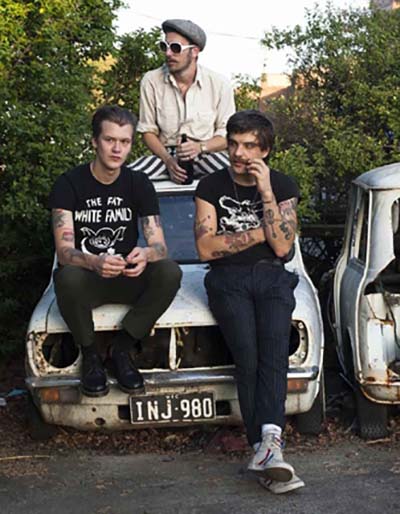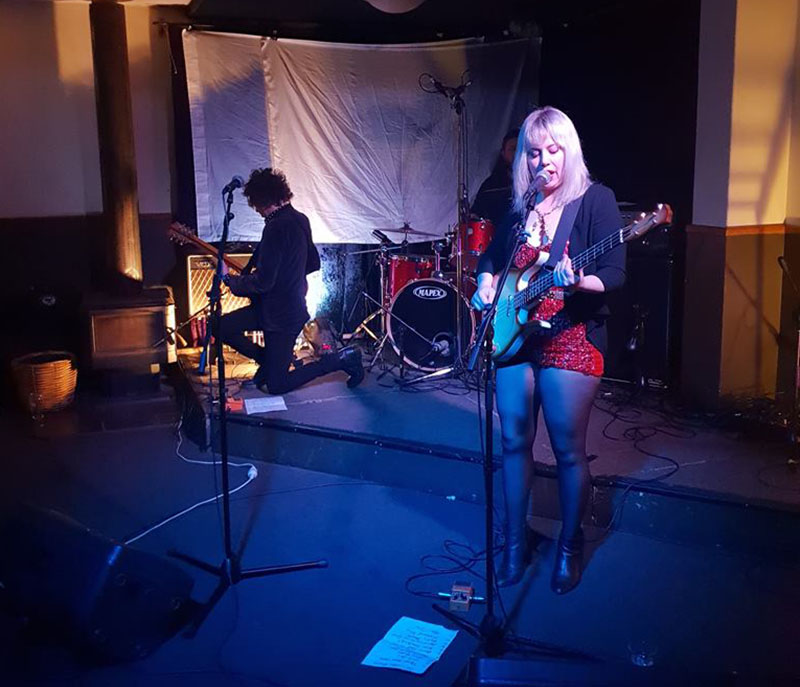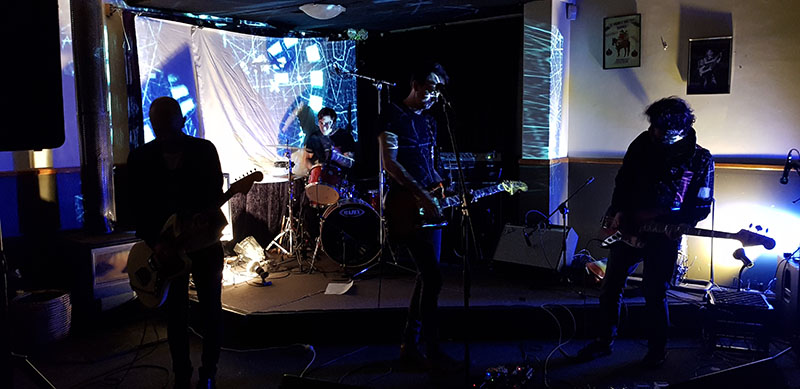 Remember ABBA? No, you probably don't want to, but there are a lot of reasons why you should. And I'll come back to this. For now, just remember ABBA.
Remember ABBA? No, you probably don't want to, but there are a lot of reasons why you should. And I'll come back to this. For now, just remember ABBA.
Now, I've been wanting to see The Braves (pictured right) for several years now, and every time I've been near Melbourne they've not been playing. Finally (after touring Europe), they've decided to "do" Adelaide.
Apparently there was mulled cider available, which no-one told me about until too late. And while I missed the first act completely, and gasbagged in another room while The Howling Fog were on: but they sounded good, and people whose opinion I trust enjoyed them, so I'll have to check them out. They're on Facebook.
 The Sunday Reeds. Craig McNeill photo.
The Sunday Reeds. Craig McNeill photo.
The Braves
Sunday Reeds
The Howling Fog
I. C T Messenger
The Metro, Adelaide,
18 August 2018
The Sunday Reeds are still sublime, Romana's bass perfectly countered by Drew's dipping, occasionally scything guitar; everything held up by a very attentive drummer. There's a lot of invention, measure and care put into their songs, and there's always a rather charming intimacy about seeing Drew and Romana onstage.
So, The Braves are a band I've only heard good things about, have heard their albums and wondered, wondered about them. Such an extraordinary approach to composition. Apart from swapping vocal roles, guitarist Kelly and bassist Djesse know their songs inside out and are so utterly into playing them (with consummate ease) that rather than perform them, they ... well, they're dancing. And I suspect that, if Ethan could play his kit and dance at the same time, he would do so, too.
They're tight, play clearly and precisely but it doesn't look like that - there are no frowns of concentration and anxious glances at each other. They all bounce off each other, making this big bastard sound all look so easy, and so much fun.
And they're a young band. None of this "boring old man" nonsense I see so much. Why habitually going out and getting wasted and destroyed is somehow superior to witnessing a cultural event which will stay with you for the rest of your life I have never been able to fathom, from 1975 to now.
So let's make this utterly clear. I spoke of ABBA earlier, and the high degree of invention in The Sunday Reeds' songs.
The Braves ... well. Their degree of invention is pretty damed extraordinary. They start with a song, twist it, embellish it, yank it, rip it and rearrange the thing into the most invigorating and exciting music I've seen since I last saw The Meat Puppets, and since The Lizard Train called it a day. And they do this with every single song. Like that other genius guitarist, Helios Creed, Kelly stuffs so much into one song that I'm telling you, some bands could take a throwaway handful of bars and make not only a song, but a fucking career out of it.
At this point, read this quote from late, great US guitarist Robert Quine, Lou Reed sideman and member of Richard Hell and the Voidoids:
…Bill Evans' 'Portrait In Jazz' has the same effect on me as a John Lee Hooker record. Then I got into the avant-garde stuff that was just happening then. Ascension and Mediations by Coltrane. I saw him a couple of times around then. I was trying very hard to understand this stuff. A turning point for me was in 1966 when I was in San Francisco. I saw him with Alice Coltrane, Pharoah Sanders, Rashied Ali. I'm trying to analyze this stuff and figure it out. I'm in the front row and all of a sudden, these two horns are right in my face. I said 'yes, I understand this.' I understood it emotionally. I was trying to analyse it too much.
...The only other stuff that really influenced me early on was the electric Miles Davis stuff from about '72 to '75. On the Corner, Get Up With It. 'He Loved Him Madly' is like my favourite track of all time. Again, when I first heard it, I thought it was boring. He dabbled in rock with Bitches Brew but by the time of Jack Johnson, it was take no prisoners- he was in there all the way.
In that sense, take Robert Quine out of the early Voidoids, and insert almost any distinctive no/new wave guitarist and you kind of have what The Braves going for - that early underground shove for the stars and new worlds (before The Grundy Incident in December 1976). You know how Quine commented about how an early influence was Miles Davis?
Imagine a young band who love Quine's stuff so much they start re-examining Davis, what he does and where he takes his seriously adventurous stuff, and then, because by then they can play so damn well, begin to integrate that approach into their own songs - without sounding remotely jazzy... Now that's what the new wave was about, wasn't it? Not so much breaking rules but finding new ways to play, new methods of expression.
Yeah, yeah, Robert, so The Braves reference from the 1950s to the 'teens, but so what? Aren't they just musical poseurs?
Nope. See that's the key, The Braves aren't self-conscious, they're as full-tilt into it as any young pissandvinegar band are. They've just just tossed a heap of shades, colours, textures and tones into the mixture, and it's so damned exciting to behold you find yourself wondering what on earth (or off it) they'll do next.
That in itself should settle it. The Braves are a fucking great band, inventive as the new wave itself - they 'get' that period like no other band after the mid-8ts - but forward-looking. Modern jazz players, hard boppers would instantly click on them; The Braves have the attitude and ire of the Beats and the street suss snarl of the punks, wrapped in a touchy, firey taco of the new, the new wave, and the right fucking now.
But hey. ABBA were a huge success, in part because of the attention and care they spent on constructing their songs. If The Braves ever decided to make their songs more determinedly commercial, lyrics and tunes will come churning, barreling, squalling out, and watch out world. The Braves have the smarts, determination, and ability to conquer. Right now, they're doing what they do because they absolutely love it, and it's a fucking joy to behold.
Power to Loki Lockwood of Spooky Records for championing them. Get Braves music here.
 The Howling Fog photo by Matt Reiner.
The Howling Fog photo by Matt Reiner.

